Robin Parrish's Blog, page 2
May 29, 2019
Join Me on an Adventure
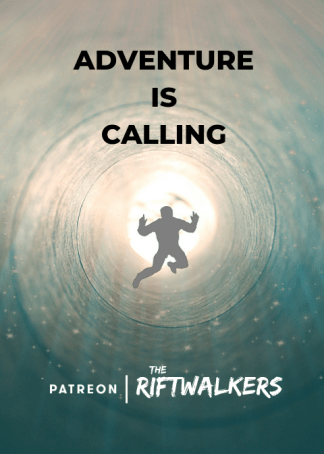 The adventure begins now.
The adventure begins now.
What if the Veil that separates our reality from the spirit world were to break down? What if the two worlds started bleeding into one another?
My new book series, The Riftwalkers, answers these questions. It debuts this summer, but it has a new home on the web where you can get behind-the-scenes info on the making of the series and what’s to come. Exclusive to Patreon, my new Riftwalkers Blog contains blogs, videos, special “Extras” (downloads, artwork, merch discounts, and more), and loads of cool rewards for supporters.
People are always asking me when my next book is coming out. If you want more Robin Parrish books, this is your chance to have a direct and profound influence on what I write and how often I’m able to do it.
I have so many mind-blowing twists and turns planned for The Riftwalkers, I can’t wait for you to get your hands on these books! You can find out much more about the series at my Patreon Riftwalkers Blog.
The post Join Me on an Adventure appeared first on Robin Parrish.
May 15, 2019
A Special Announcement
The post A Special Announcement appeared first on Robin Parrish.
December 23, 2018
The Magic of Christmas
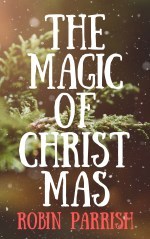 Published: 12.17.18
Published: 12.17.18
DOES MAGIC REALLY EXIST?
On the night before Christmas Eve, Henry Oliver finds himself swept up in a wild adventure at the North Pole, a fortress where the fables of Christmas have gotten many details wrong, and invasion by fantastical, holiday-related creatures is always one heartbeat away.
When Henry is asked to help with an important task that will allow Christmas to come this year, he’s not interested. Once upon a time, he loved all things Christmas. But having recently lost his belief in Christmas’ wonder and magic, he never wants to celebrate the holiday again. Fortunately for the rest of the world, the very real St. Nicholas, a humorless Elf, and one lovable but not-too-bright reindeer have other plans for Henry.
Buy ebook Now exclusively from Amazon.com.
The post The Magic of Christmas appeared first on Robin Parrish.
November 4, 2018
Stepping Outside of Myself
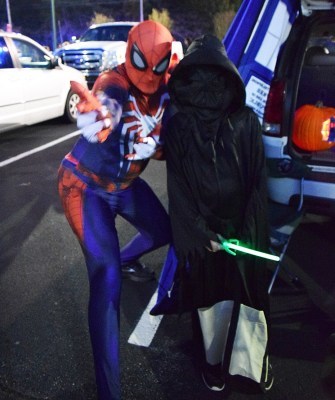
Your friendly neighborhood author (and a friend).
Photo by Heather Conner.
On Halloween night, I attended our church’s annual “Trunk or Treat” night, where my family (okay, mostly my wife) put together a trunk for the kids who came. I went as Spider-Man, and it turned out to be a very special experience.
I expected the kids that attended would think it’s cool to see a guy dressed in a fairly authentic-looking Spider-Man suit (I was leaning more toward “cosplay” than the standard “Halloween costume”), but I had no idea how big a deal it would become.
Hardly a minute or two went by (and sometimes a handful of seconds) when another boy or girl down the line would spot me and shout, “It’s Spider-Man!” Many times they bypassed the candy we were giving out altogether and came straight to Spidey. Most of them wanted high fives or fist bumps. There were probably 10-15 whose parents asked if I’d pose for pictures, and I tried my best to contort into a cool Spider-Man pose.
As incredible as those moments were, they weren’t my favorites. That distinction belongs to the five or six little ones — probably 2 to 3 years old, each — who without a word and without hesitation, ran up and gave me a big hug. “I love you, Spider-Man,” a few of them said. “Spider-Man loves you too, buddy,” I replied as I hugged them back.
To say that it tugged on my heartstrings does not do the event justice.
I don’t make a particularly impressive Spider-Man. I may be thinner than I used to be, but big muscles and the ability to grow them are not something God has ever gifted me with. I’m still a little squishier around the middle than I’d like to be. Then there’s the suit, which was cheap and poor quality. It didn’t fit so well, and I couldn’t see through the lenses. At all. (But the fact that we were in a parking lot with no bright lights actually helped sell the illusion.) By the end of the night, the suit was showing a lot of wear and tear.
But none of that mattered. For one night, I was Spider-Man, a real superhero that made a whole bunch of kids very, very happy.
And now I think I know what I want to be every year for Halloween.
Living with chronic pain and invisible illnesses is no fun. The pain ebbs and flows but never goes away, you’re always tired and want more sleep, and your mind decides to forget things that it knew just a few hours ago. That’s the tip of the iceberg. But for a few hours this week, I got to step outside of that person and be someone else. It was exhilarating! No thinking about my pains or fatigue or money or stress or whatever else; I existed purely as a real-life superhero to several hundred children.
I think it was one of my favorite things I’ve ever done.
Now if only there was a way to cosplay as Spider-Man for a living…
The post Stepping Outside of Myself appeared first on Robin Parrish.
July 9, 2018
How to Solve the Skywalker Problem
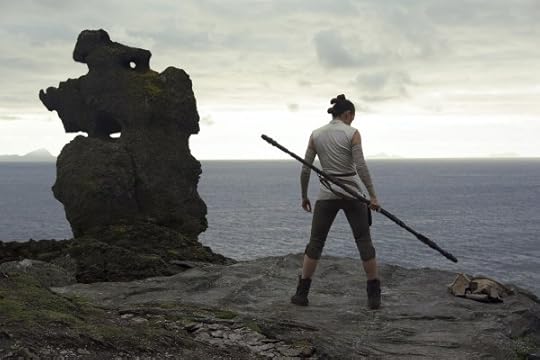
A few years back, Lucasfilm CEO Kathleen Kennedy famously said that the episodic Star Wars “saga” films are and always will be the story of the Skywalker family. From Episode I on, we’ve followed Shmi, Anakin/Vader, Luke, Leia, and now Ben/Kylo Ren.
In The Last Jedi, it’s revealed that the new trilogy’s heroine, Rey, has no connection to the Skywalker lineage. She’s not a Skywalker, a Solo, a Kenobi, a Windu, or even a Palpatine. She’s “no one” from “nowhere,” a development that worked narratively and emotionally for the character; it was the worst news Rey could have possibly received, yet she managed to rise above it and persevere. That’s what being a hero is all about.
But fans were kinda disappointed. Because logically speaking, how could the newest Jedi of the Star Wars saga not be a Skywalker? Not only did it break with the narrative pillars of the rest of the saga, it also meant that the evil Kylo Ren is the last of the Skywalker line — a development that doesn’t bode well for the line’s future.
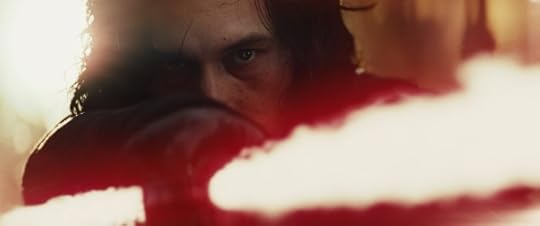
I suppose it’s not entirely true that Rey has no link to the Skywalkers at all. She seems to have a mystical connection to Kylo Ren through the Force. I’m not talking about their Force-powered heart-to-heart conversations as seen in The Last Jedi. I’m talking about what Snoke meant when he said that “the darkness rises, and the light to meet it.” He told Rey that he’d warned Kylo Ren that as he came into power, his opposite in the light would rise as well. So it’s pretty clear that Kylo and Rey are equally matched as the new avatars of darkness and light, just as Darth Vader and Luke Skywalker once were.
But that doesn’t address the Skywalker question. What is their legacy if Kylo Ren is the last of their line? The current state of affairs suggests that he won’t ever be having children, though if he were to turn back to the light side in the end, anything’s possible. But he made his choice and redemption doesn’t appear to be an option. So it’s likely he’ll only be defeated in death. If there are no other Skywalkers — aka, if Rey isn’t one, and neither is anyone else, and Luke and Leia are both dead — then Episode IX will showcase the end of their lineage.
That puts a nice little button on the final episode, since the saga started with the rise of the Skywalker clan and will end with its conclusion. There are no current plans for anymore Skywalker episodes, but cutting off the Skywalker clan entirely would be commercial suicide for the saga. That’s not the Disney way of doing things.
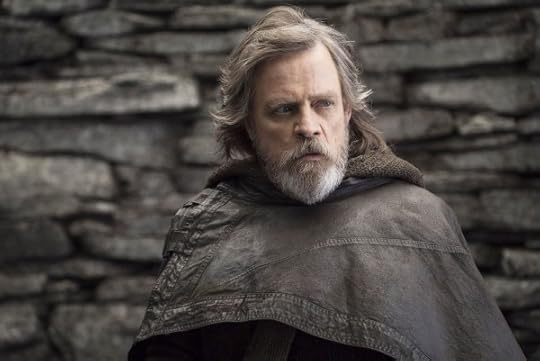
So how do you keep that door open, even if it’s just a sliver? And how do you make Rey a connected part of the franchise, without losing the poetry of her rising from “no one” to becoming the galaxy’s last best hope?
Here’s what I would do.
Halfway through Episode IX, or maybe closer to the end, Rey is working with Poe, Finn, Rose, and the rest of the Resistance, coming up with one of their usual desperate, last-ditch plans. At one point, during a moment alone, she’s surprised by a visit from Force Ghost Luke.
“You will face Ben Solo once more,” he tells her. “Whatever the outcome, he is already lost.”
“I know,” Rey replies sadly. “He’s too far gone.”
“You can’t save him, Rey,” says Luke. “Even Leia had to let him go.”
Rey nods, sadly. It’s hard to accept, but she knows it’s true.
“Is that why you came, Master Skywalker?” she asks. “To absolve me of responsibility for Ben’s fate?”
“No,” says Luke. “I wanted you to have something.”
She turns to look at him fully, now curious.
“It’s a small gift, but if you want it, it’s yours,” he says. “Although I would understand if you don’t. This galaxy will not leave you in peace once you possess it.”
Rey is even more curious. “What is it?”
“The only thing I can give you,” he says. “The one thing you’ve never had: a heritage.”
Rey offers a very slight smile, just starting to catch on.
“I realize the gift of family is a little late at this point,” he jokes. “But I think you’ve earned it.”
Rey considers this, grinning. “Really? You want to make me a–?”
“Rey Skywalker,” he replies. “It has a ring to it.”
Rey stares at him in disbelief, mulling over what he’s offering. A name, a family, a place of belonging. Things she’s never, ever had, and longed for all her life.
“Just like that?” she asks, still smiling. “You can do that?”
“I am one with the Force,” he replies, a kindness in his eyes that was missing when the two of them were together while he was alive. “Do you really think anyone could stop me?”
There you go. Luke can’t legally adopt Rey; he’s dead, after all. But he decides that in every way that counts, she’s a Skywalker. That name is not an easy thing to have, as he points out, because it comes with baggage both good and evil. But with all of the Skywalkers dead, their heritage needs a custodian.
Thus, Rey Skywalker is born.
Not that anyone asked… But that’s how I’d keep the Skywalker saga alive.
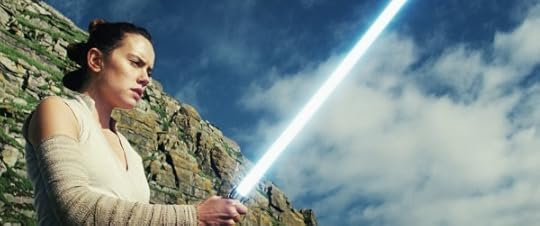
The post How to Solve the Skywalker Problem appeared first on Robin Parrish.
July 5, 2018
What I Remember About Writing FEARLESS

So I made it through Relentless. It wasn’t easy turning an online serial into a printed novel, but I did it. Now I had to figure out the sequel. Fearless was an odd beast. It was the toughest nut to crack of the three, the hardest one to write, and it’s my least favorite of the trilogy.
But I’ve heard from a number of people over the years who say it’s their favorite. Go figure!
Spoilers ahead for Fearless (and Merciless, too).
In the Middle
Where Relentless was fully plotted with great detail before I wrote a single word, the entire Trilogy I had nailed down a little less so. I knew Grant’s body would eventually be overtaken by the entity I called Oblivion. I knew almost everything that would happen after Grant died. (Like Relentless, most of Merciless existed in my head before it was committed to paper. But that’s a story for another day.)
Fearless was a different animal. The challenge it presented was telling a satisfying “middle” of the trilogy — lovingly known as having “no beginning and no ending,” a la The Empire Strikes Back or The Two Towers — without it merely being filler. Every word needed to feel as crucial as the opening entry and the conclusion. If it’s just filler, if I’m biding time until I get to the big reveal at the end, then the reader’s going to know it. Readers are smart cookies. If I’m not passionate about what I’m writing, they’re not going to enjoy what they’re reading.
Middle chapters in trilogies are the trickiest of the bunch. I studied trilogies like Star Wars, The Lord of the Rings, The Hunger Games, and more, to try and discover what makes a successful middle story. On the plus side, they don’t have the heavy lifting to do like the first volume; no introducing a multitude of characters and setting up their situations. You can dive right into the story and be all caught up (assuming you read the first book — and I assumed). On the downside, they don’t have the promise of a climax or hope of a satisfying resolution that the final entry offers. Successful middle chapters in epic, world-in-danger stories like the Dominion Trilogy will:
Raise the stakes. Not just in a grand, “we have to save the world” way, but the emotional stakes for the main characters, too.
Deepen the reader’s understanding and investment with the main characters. One reason a new TV show struggles to get viewers invested in its cast of new characters is the very fact that they’re new. There are tricks you can employ, like creating sympathy for your protagonist, or having them do something or suffer something that viewers will instantly identify with. But true investment and love of great characters takes time. Viewers and/or readers have to spend time with a character, live with them for a while, go on adventures with them, and experience their highs and lows. That’s how you invest a reader in your character. So second and third chapters have an advantage in this respect — but the writer still has to do their job of providing compelling drama. Drama that will…
Grow and evolve the characters, emotionally and relationally. Provide compelling drama that pushes and changes the main characters, advancing their stories in ways both unexpected and satisfying.
Outdo the first chapter in scope and scale. This is the Lord of the Rings rule: Everything has to be bigger in Part 2. (And Part 3 has to have the biggest scope of all.) One way I elected to do this was to take the reader beyond the familiar territory of the first volume (Los Angeles) and see how the events the main characters have experienced are affecting the wider world (London, Jerusalem, etc.).
Set the stage for the grand finale, while also providing some semblance of closure or satisfaction with this one volume. The middle chapter has to not only keep the momentum going from the first book, but amplify it so the story becomes a runaway train barrelling toward the big finale that’s still to come by the end of the second book. Losing that momentum, stopping it in any way, is narrative death.
Like most things in the Dominion Trilogy, I took these rules to heart and employed them quite literally. I raised the stakes by having the world fall apart, with one disaster or cataclysm after another. I sent my characters in new directions (more on that later), pushing them to their limits. I drew on a much bigger canvas, having my team of superheroes travel the world and visit real-life locations. And I set the stage for the finale with one whopper of a cliffhanger — which amazingly, my publisher let me do.
Forward Ho
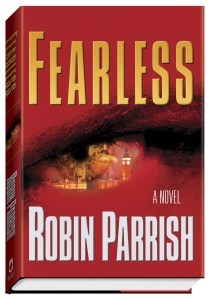 I had only the loosest of ideas of what Fearless would be about, so nailing down the details took a lot of trial and error. Long ago, I wrote a short story called “The Library” that was about a hidden floor in a public library, which an average Joe found himself drawn to. He would later wake up having had his memories of the Library erased, and “held for ransom” until he completed a morally difficult task. The librarian there eventually informed him that this “true” Library was a collection of files about the “most important people in the world.” The big twist was that my main character was told, as the Library was burning down around him, that one of those files had his name on it.
I had only the loosest of ideas of what Fearless would be about, so nailing down the details took a lot of trial and error. Long ago, I wrote a short story called “The Library” that was about a hidden floor in a public library, which an average Joe found himself drawn to. He would later wake up having had his memories of the Library erased, and “held for ransom” until he completed a morally difficult task. The librarian there eventually informed him that this “true” Library was a collection of files about the “most important people in the world.” The big twist was that my main character was told, as the Library was burning down around him, that one of those files had his name on it.
I’d never found a good use for that story, though I really loved it. Literary magazines aren’t in the habit of buying short stories that conclude with an open-ended twist that requires a sequel. So one of my first ideas for Fearless was to take pieces of this unused story and incorporate it. That’s how the London Library entered the story.
From there, I had sketches of other ideas… I knew I wanted more Ringwearers, so I introduced plenty of those, including a team of four Brits. (I always wanted more from those four, but their potential never quite materialized, in my opinion.) I loved playing with the question of whether Grant might be subconsciously causing the disasters happening around the world.
And I knew that I had to go all in on the superheroics in this one. Relentless was a crazy mashup of superheroes, conspiracies, prophecies, and more. Merciless was set to be a major departure from everything that came before, so traditional superheroics were going to be out of the picture by then. So it was an easy decision to come to that Fearless would be The Superhero Book. The glory days for Grant Borrows, aka “Guardian,” and his superfriends.
I dove as deep as I could into pure superhero tropes, but it could only start in that kind of place. As the book unfolds, the heroics are increasingly countered with the inevitable threat and confrontation between Grant and Devlin at the Secretum’s hidden city.
If you find that the tone goes from light and fun (more or less) to grim and foreboding, then I did an adequate job.
Testing Boundaries
Before, I mentioned that my editor and publisher let me get away with a crazy cliffhanger ending, but that wasn’t all I got away with. I pushed the envelope of what a Christian publisher would be willing to publish with Fearless. I don’t know, maybe I was feeling full of myself because Relentless had been somewhat successful. But I strongly felt that I couldn’t do justice to the dire nature of the story — the world was literally falling apart from endless disasters, people were losing hope on a global scale, etc. — without going a little grittier and getting my hands dirtier.
So I put in some things that I thought were fairly gritty, and then waited for my editor to tell me that those bits would have to be cut. With only one or two exceptions, that never happened. A few I can think of off the top of my head… In his first scene, Payton tells an opponent that it “sucks to be you, mate.” I don’t think it was common at the time for “suck” to appear in a Christian publication (it’s probably still not). At the book’s outset, we see Alex doing the superhero thing, rescuing a girl who’s about to be raped. Alex actually alludes to the attacker’s sexual arousal with a double entendre. I thought for sure that would be a no-no, but either it wasn’t noticed or was deemed tame enough to let through. Late in the novel, when Payton takes on a small Secretum army with his sword and his bursts-of-speed powers — one of the best Payton sequences in the trilogy, in my biased opinion — he dispatches them with brutal efficiency. At one point, he actually cleaves an opponent in half vertically. I was flat-out shocked that I got away with that one. It could only have been because I didn’t describe it in detail.
On the other hand, the climactic moment when Julie is shot in the head was one I was asked to pull back. My original description of her death was more graphic. I wasn’t all that upset at losing that part of it, and in retrospect, it was the right move. The moment was appropriately jarring without having to take it that far.
Who and Why
I always knew I wanted the Dominion Trilogy to feature a huge cast of characters, so I used Fearless to fill out the roster and make it much bigger. It occurred to me that the U.S. government wouldn’t be too keen on this incredibly powerful man operating as a superhero without oversight, so I created FBI Agent Ethan Cooke. I added a ton of new super-powered people like Nora and Wilhelm who all joined up with Grant’s group in the time jump between the first book and this one. I considered having some of them turn on Grant and function as minor villains, but with so many characters from Relentless still around to do justice to, there wasn’t room for that kind of subplot.
The biggest death — up until the book’s final moments, anyway — was Morgan. Losing her stung, no denying it. Anytime you’ve got a character who’s as strong in their convictions as Morgan is, it’s hard to let them go because they’re so appealing. But it’s the old Hero’s Journey adage: the mentor always dies. The elder guide steps aside so the hero can rise to the occasion and fulfill their full potential, their destiny. I had two mentors as I mentioned last time, and I still needed Daniel for the part he was to play in Merciless. Had Morgan outlived her usefulness? Not necessarily. I can see a scenario where she would have had plenty to do in Merciless. But losing her gave me more to work with — particularly for Payton’s emotional arc.
This was the book of consequences, where my characters had to deal with the fallout of their decisions from Relentless. No one felt the weight of those decisions more than Daniel, whose conscience was torturing him for murdering the wicked Detective Matthew Drexel. Alex finally had to face up to her hidden feelings for Grant. Julie’s medical condition worsened, while she struggled to keep functioning as Grant’s conscience. Payton, having been manipulated for the umpteenth time in his life, grew angrier and deadlier than ever, barely containing his rage. And Grant…
Grant was trying his best to do the right thing. To be the hero that the world needed, despite his power being rooted in darkness. Which brings me to a central theme of the trilogy. It’s a question that’s a crucial piece of the puzzle, but somehow no one has ever asked me about it: Is it possible to do good using powers born out of evil? Some people took me to task for not mentioning “God” or “Jesus” in the trilogy, but I said from the start that this was a kind of allegory. If you don’t see in that same central question an allusion to man’s sinful nature and his inability to be good on his own… I don’t know how to help you.
Down Below
I’m not sure what it is about massive underground spaces that fascinate me, but they keep turning up in my books. Maybe it’s the thought of something unfathomably huge remaining hidden from the world. Or maybe it’s just the size of it that I find visually stimulating. Whatever it is, they inspire awe in me, which is always a great foundation for drama. In Relentless, there was the lair of Maximillion Borrows hidden deep below Grant’s home. Offworld‘s Quantum Machine was another one of these underground spaces. Even Nolan Gray’s subway hideout in Vigilante followed this pattern, albeit at a much smaller scale.
Fearless introduced what was and still is my biggest underground space ever: the massive cave dwelling inside a mountain that the Secretum called home. I couldn’t get out of my head the image of a ginormous stalactite with a city carved out of it and built up around it. Man, I’d love to see that visual realized somehow.
So About That Cliffhanger…
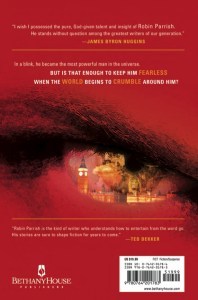 The cliffhanger, for me, was the secret sauce in Fearless. It was the one thing I had planned out in detail from the start, and it was the linchpin that the whole book was built on. As far as I was concerned, Fearless could not exist without that cliffhanger. It was non-negotiable.
The cliffhanger, for me, was the secret sauce in Fearless. It was the one thing I had planned out in detail from the start, and it was the linchpin that the whole book was built on. As far as I was concerned, Fearless could not exist without that cliffhanger. It was non-negotiable.
I always knew precisely what the cliffhanger was going to be — time stopping and Devlin shoving Grant down the hole were my favorite parts — before I began writing Fearless. To their credit, my publisher Bethany House never balked at ending on what’s basically a crushing defeat, one that threw the fate of my protagonist, his supporting cast, and the entire world into major peril. It literally left readers wondering how I was going to pull off a third book if my hero was dead.
Well, I knew how, and I was determined to get there.
Some writers will tell you that in a trilogy or a series, each entry must tell a complete sub-story with a beginning, middle, and end of its own. As such, they believe that a cliffhanger betrays that structure because it provides zero closure. Even writers who are willing to employ cliffhangers typically go about it with subtlety.
I tossed subtlety out the window and pulled out all the stops! I wanted a giant, honking cliffhanger, but it wasn’t for nothing. I needed it for a number of reasons.
It worked with the story. The cardinal rule of cliffhangers (or even just big mysteries) is that your resolution has to be every bit as jaw-dropping, if not more so, than the cliffhanger itself. If you don’t have a great resolution that tickles the imagination, if you have to resort to cheating — “You know that thing I made a really big deal about happening in the last book? It didn’t actually happen! Gotcha!” — you’re going to lose your reader’s trust, and rightly so. I felt pretty confident that in the rise of Oblivion and what he does to the world and to my main characters, I had a resolution that was both satisfying, and that opened up the story to bigger possibilities than the cliffhanger alone provided. I’m still kinda proud of that.
As a subscriber to JJ Abrams’ Mystery Box theorem, I loved the idea of igniting readers’ imaginations with this huge, shattering ending that couldn’t help but fundamentally change everything about the entire trilogy. The intent was never to torture the reader; I wasn’t blind to the fact that readers would have to wait a year between books to find out what happens next. The idea was to stimulate the possibilities within their minds about what could possibly come next. (These kinds of stories are always a cat-and-mouse game between writer and reader, with the former doing everything they can to prevent the latter from figuring out their secrets before they happen.) If the greatest gift a writer can give his or her reader’s imagination is to “leave them wanting more,” Fearless‘ ending gave my readers a huge, house-sized mystery box wrapped up with a bow.
In my mind, the cliffhanger ramped up the anticipation for Merciless. Not only did it kinda/sorta guarantee that readers who’d followed along this far would be desperate to get their hands on the finale, to me it made Merciless‘ eventual arrival feel more momentous.
Was its arrival as momentous as I hoped?
Stay tuned.

The post What I Remember About Writing FEARLESS appeared first on Robin Parrish.
June 18, 2018
6 Things People Don’t Know About Me
I’m not OCD. I’m not a germaphobe. But I can’t stand for my hands to be sticky. There’s a famous story in my family about how I refused to take part in finger painting in kindergarten. Some things never change.
2. I can draw.
I’m couldn’t sell art or anything, but I can sketch respectably. When I was younger, I could look at any object and recreate it with paper and pencil. My son appears to have inherited this ability — but he far surpasses me. He’s able to do it from memory, and make up original things as well.
3. I always wear socks.
I never go barefoot. Don’t know why. Just doesn’t feel right without socks on. Exceptions are Hapkido class or the beach.
4. I’ve got mad bargain shopping skills.
For realz. Any store I enter, I make a beeline for the clearance section. I’m not ashamed to admit that most of my clothes come from clearance. My favorite online store is a closeout deep-discount store called Hollar. I’ve found lots of cooking gadgets for MANterest at Hollar, and most of what they carry is just $1-3! Shipping is free if you order $25 or more.
5. I cut my own hair.
Maybe I’m kidding myself and people have already figured this one out on their own…
6. I rarely read books.
I know, I know. Shameful for an author. But when you spend most of your day, everyday, staring at words, reading is pretty much the last thing you want to do when you have downtime. I play video games to unwind.
The post 6 Things People Don’t Know About Me appeared first on Robin Parrish.
June 8, 2018
What I Remember About Writing RELENTLESS

I wrote Relentless, my first novel, some 13 years ago. Hard to believe it’s been that long. Here’s a look back at what I remember about what it was like to create this book, with loads of never before revealed details about the process.
Spoilers ahead.
Origins
The entire Dominion Trilogy came from this crazy flash I had in my head one day: a man steps off of his morning commuter bus in a big city, looks across the street, and sees himself walking to work. It was preposterous, of course. But that’s the job of a writer: to make the reader believe the impossible.
I became obsessed with that image. A million questions came to mind: What was happening? What could cause something like this to occur? How is it possible? Who was this man? Who was the other man?
I had to answer them. And that’s how Relentless began. As my first novel, it was this sort of explosion of pent-up creativity. Pretty much every cool idea I ever had (to that point) got poured into it, which is how it wound up with superheroes, secret societies, conspiracies, and one crazy cool sword-wielding assassin.
In the Beginning
 When I first wrote Relentless, it was called Prodigy, and it was published in serialized installments at Infuze Magazine, a website I ran at the time. If I recall correctly, I think there were 18 chapters, all of which were in the 10,000-word neighborhood. I published every other Friday, and you can probably guess the number one question I got asked all the time:
When I first wrote Relentless, it was called Prodigy, and it was published in serialized installments at Infuze Magazine, a website I ran at the time. If I recall correctly, I think there were 18 chapters, all of which were in the 10,000-word neighborhood. I published every other Friday, and you can probably guess the number one question I got asked all the time:
Do you have this all planned out, or are you making it up as you go?
I had it planned out. I left wiggle room for surprises to come along — and they did — but I knew the destination I was headed towards and all of the major beats. At the time, I thought of the story as a one-off. There was room left at the end for further adventures, sure, but I didn’t have any concrete plans for where I would take these characters next. Toward the end, I was already itching to get started on The Void, the novel that would become Offworld.
Then Bethany House Publishers came calling with a sweet deal: turn Prodigy into a trilogy of hardback novels, release them a year apart, and they offered me a very nice advance. Breaking Prodigy into three stories didn’t appeal to me, so I suggested making it just the first book, and then writing two additional books to continue and finish the tale. They agreed.
Who’s Who
Anyone who’s read Relentless knows that it’s a very plot-driven book. (The second and third books I think are more of a blend of character-driven and plot-driven.) I make no apologies for that; it’s the nature of the story I wanted to tell. But it means that I didn’t put a ton of effort into crafting three-dimensional characters. That said, I did put thought into who each of my main characters were and what role they would serve in the story, drawing largely on “hero’s journey” archetypes.
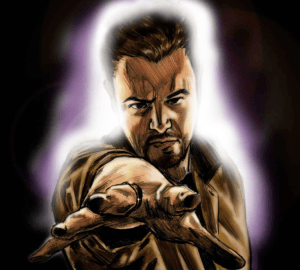
Art by Tim Bates
Grant Borrows: More than any other character in the series, Grant is me. His reactions are mine, he speaks like I do, his way of thinking is how I think. From a broader perspective, he’s the archetypal Everyman, which was crucial to this story. You should always have a surrogate for the reader, particularly when you have this kind of huge, mind-bending jigsaw of a story that you’re peeling back a layer at a time. Everything in the first book unfolds from his point of view; he learns things at the same time that readers do. But he’s placed in a pressure cooker of a situation, thanks to this mega-powerful artifact on his finger that’s rooted in darkness.
As the book suggests, his name was very intentional on my part. The words “grant” and “borrows” both describe a person who’s living inside a new body. Plus, it rolls nicely off the tongue.
As the trilogy unfolded, it (hopefully) became clear that it wasn’t just Grant’s story. It really revolved around the triptych of Grant, Alex, and Payton. Closely followed by Daniel, who got what I thought was a nice, full story arc across the trilogy.
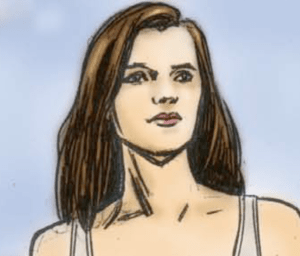
Art by Tim Bates
Alex: I created Alex to be a combination of Herald and Shapeshifter. The Herald appears early in a story and opens the Hero’s eyes to the bigger world that awaits them, and the challenge that lies before them. In short, they call the Hero to action. But I liked playing with the mystery of who Alex is, who she’s loyal to, and why she’s so interested in Grant. That’s where the Shapeshifter part comes in. She’s never a proper Shapeshifter in that her loyalties never change, but I wanted readers to think there was the possibility she might not be looking out for Grant’s best interests. (In the second and third books, Alex shapeshifted again, this time into Grant’s love interest!)
Alex is always barefoot because I wanted her to be an outsider and a nonconformist; it symbolized her comfort with being herself and not caring what others thought of her. She sees the world very differently than most people, because she knows the truth behind the Rings of Dominion and what’s happening to Grant, and so on. She was the “other,” and everything from her dress to her way of speaking was intended to convey that.
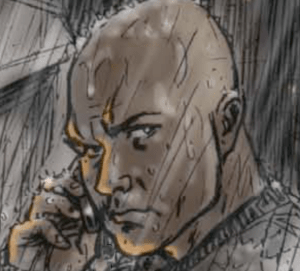
Art by Tim Bates
Payton: everyone’s favorite! Payton is a classic Guardian, a character who blocks the Hero from completing his journey with a stern warning to turn back and give up this foolish quest. Of course, Payton’s idea of warning Grant was to kill him, but hey, he’s an extreme, black-and-white kinda guy.
Payton was so much fun to write, because he’s got the bad-to-the-bone vibe, he’s supremely confident and 100% unwavering in his certainty of purpose, he’s got an awesome superpower (short bursts of speed) that he used with a super-cool weapon (a sword that can cut through anything), he’s got a very British “I don’t care about anything except my goal” thing going on in a James Bond sort of way. And he’s incredibly focused. He never deals in shades of gray. He sees no moral quagmire with executing evil men, believing that one’s punishment should fit their crime.
I loved being able to build up his entrance, because once he arrived, Relentless kicked into overdrive. But he was always going to become an Ally, eventually.
Daniel: Daniel was very much inspired by Kiefer Sutherland’s character Dr. Schreber from the movie Dark City, one of my favorites. (I didn’t realize it at the time, but they even share the same first name!) Instead of one Mentor, I gave Grant two of them. One would examine things and reveal things and coach Grant based on science. That’s Daniel. The other — Morgan — would do the same from a more mystical or supernatural perspective. I’ll have more on Daniel later.
Julie: As Grant’s loyal sister, Julie is the classic Ally. And (spoilers for Fearless) yes, she was always destined for the chopping block. I was originally going to have it happen in Relentless because I knew it would catalyze Grant’s inner moral conflict, but I decided to save it for Fearless because it was the biggest blow Grant could receive, which I needed for the end of that book. I made her ill to underscore her frailty; as sister to the most powerful human being on the planet, she’s thrust into many of the same dangers that he is, but she has no powers to protect her. That’s a very perilous situation.
Hannah: the Southern beauty-slash-cat burglar-slash-star crossed love interest. Call it your standard doomed romance. She was exactly the wrong person for him, and he for her, but they fell in love anyway.
It was always going to end badly for her, I’m afraid. It’s never easy killing off one of your characters, especially one you’ve spent hundreds of pages writing. But I knew Hannah’s fate from the start, which eased the pain somewhat.
Morgan: I designed Morgan to be the second half of the Mentor archetype, after Daniel, but where he was very scientific and detached, I wanted Morgan to be a nurturer. She would be a protector of others like Grant, and a warm, motherly figure. Her love of reading and all those countless books that filled her hallways came from her superpower — remembering every moment, every fact, every detail she’s exposed to.
I thought at length about how someone in that situation would function, and it occurred to me that if you saw, heard, touched, tasted, and felt the same sensations again and again and were hypersensitive to them and could remember every minute detail… Pretty quickly, you’d go insane with the ho-hum nature of it all. My daughter has a tendency to repeat herself. Over and over and over, she’ll say the same things. It drives me mad. Morgan would experience this with every sensation of her daily life. All that hypersensitivity would cause an unbearable sensory overload.
So I gave her books to lose herself in. Morgan’s books are her escape from the endless noise around her. They’re also her window to excitement, to things that are new and different. They increased her intelligence and already massive frame-of-reference as well.
Lisa: Daniel is so uptight, and he was always going to need someone to interact with before he met up with Grant and the others. Lisa became one of my favorite characters to write because she has no filter between her brain and her mouth. If she thinks it, she says it. She’s a Joss Whedon-ish Trickster in that way. My original plan for Lisa was for her feelings for Daniel to be unrequited, a fierce loyalty that was born out of a love he was too aloof to notice. But things intensified for them both after a certain major development. More on that in a sec.
Matthew Drexel: your standard corrupt, mob-style cop. I make no pretenses about the fact that Drexel is not unlike a cartoon villain. There’s nothing redeemable about him at all, no subtle shades of gray. He’s pure evil, out for number one, and willing to stomp on anyone to get ahead. I’ll be blunt: Drexel exists because I needed a bad guy to propel the action forward.
I didn’t enjoy writing him because he was a monster — and he was monstrous for no good reason. At least Grant’s grandfather, and later Devlin, believed they were doing what had to be done for the greater good. Drexel doesn’t care about any of that stuff. He’s bad because he has a sadistic love of having power over others.
Maximillian Borrows: Relentless was a typical case of needing a worthwhile big baddie to appear from behind the curtain — but just for Part One. A supervillain who would hold all the cards and be extremely hard to defeat… But would still leave room for the über-villain that was yet to come. Max was Darth Vader to Devlin’s Emperor. His backstory was that he went rogue from the Secretum and tried to bring about the end of the world in his own way, triggering Grant’s darkest impulses by pulling the rug out from beneath his grandson piece by piece, again and again, until he snapped. It didn’t work out too well for him, but you have to admire the lengths he went to in pursuit of his goal.
Side note: In Prodigy, I had three characters with remarkably similar names: Daniel, Dana, and Dane. It was not on purpose. In fact, it didn’t even dawn on me until my editor at Bethany House pointed it out and suggested changing two of them. I was mortified when I realized! Total face-palm moment. I just happened to like all three of those names. For Relentless, Dana became Hannah and Dane became Payton.
Twists & Turns
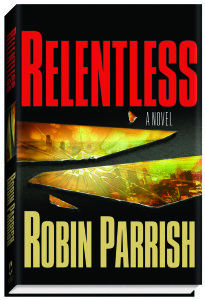 Any book I write has to be one that I want to read. Any author can expound upon the importance of this. If I’m not passionate about it as the writer, you won’t care about it as the reader. Passion bleeds through the page.
Any book I write has to be one that I want to read. Any author can expound upon the importance of this. If I’m not passionate about it as the writer, you won’t care about it as the reader. Passion bleeds through the page.
So it had to include twists, surprises, big questions and big reveals, elements of fantasy and superheroes, and so on.
As for those surprises that came along, none of them stunned me more than what happened to Daniel. It was never in my original plan that he would get beaten to within an inch of his life and come close to dying. His trajectory was always going to slowly merge with Grant’s, but I realized pretty early on that his storyline needed a big jolt or it was going to get boring fast.
I don’t know where the idea came from, but as soon as the thought popped into my head of the villainous detective, Drexel, having Daniel beaten nearly to death as an excuse to search his lab… Daniel’s entire story crystallized in an instant. His investment in what was going on — not to mention his connection to the Secretum’s master plan — would take on an immediacy, with higher stakes, and a need for answers and justice. Janet’s attraction to him would become more profound as she watched him and helped him fight for his life. And the whole thing would instill in him a deep hatred for Drexel and a desire for revenge that couldn’t be sated with anything less than Drexel’s death.
And of course this gave me plenty to work with going beyond the first novel. There’s nothing like a good redemption story — and his quest for revenge contrasted beautifully with Grant’s ultimate refusal to give in to the same.
But when I thought of it, I almost heard Daniel speak to me inside my head. Talk about surreal! No, Mr. Author. You can’t do it that way. You have to do this instead. It’ll be hard, but it’s what the story needs.
And it was hard. I felt sick after writing that scene.
Flashbacks
In each of the three books, there’s a single chapter near the middle that takes a break from the action and rewinds to the childhood or early adulthood of Grant (Relentless), Alex (Fearless), and Payton (Merciless). These were fun to write, because the whole trilogy allowed me to play with notions of nature vs. nurture. How much of who we are is with us from birth? How much is programmed into us by the world and our experiences?
In other words, were Grant, Alex, and Payton the same people at earlier points in their lives, before they were Shifted, that they are now?
Grant’s flashback in this book showed that he was hardened early on to being the kid who never had many friends and was always picked last. (Yes, there are some autobiographical elements there.) He knew his place in society was always going to be the guy who stands in the corner alone at a party. And yet, fate intervened — and by “fate,” I mean the nefarious secret society called the Secretum of Six — giving him a new life. They transformed his appearance, his voice, and his physical capabilities and prowess by transferring his consciousness into a stronger, handsomer, more vital body.
How would you react to that — to being given a second chance at having the kind of life you always secretly dreamed of? Would you let it change you on the inside? Or is the inside always hardwired into who you are, no matter how your circumstances change? I explored this question again and again throughout the Trilogy.
As for Grant’s transformation… It was wish fulfillment. I don’t deny it.
From Screen to Page
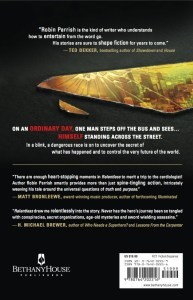 Turning Prodigy into Relentless required some rejiggering. Characters that didn’t quite make sense had to be reworked, story beats that were too convenient had to be ditched or replaced. It was relatively painless, though.
Turning Prodigy into Relentless required some rejiggering. Characters that didn’t quite make sense had to be reworked, story beats that were too convenient had to be ditched or replaced. It was relatively painless, though.
My favorite thing about the rewrite was that it gave me the opportunity to go back and start incorporating characters from later in the book — like Morgan and Payton — into the story sooner, planting seeds of suspicion and doubt about who and what they were. Those new Payton scenes that were added for Relentless are still among my favorites.
“It’s not for buttering toast, love.” Man, I love that line.
Some details changed along the way, but the root of the story remained the same. Grant was still Grant, Alex was still Alex, he was still trying to piece together this new life that fate had given him, Alex was still being maddeningly cryptic, and it was all leading to a big showdown deep below Grant’s apartment building. (This story beat kicked off a long-running fascination of mine with massive, underground spaces. I’ll dive into that some other time.)
To the Point
Relentless was always going to culminate in Grant having to make the most difficult choice of his life: Would he give in to the darkness growing inside him and seek revenge, as Daniel did? The deck was stacked significantly higher against him than it was Daniel, thanks to the incredible power he now possessed and where that power came from; it would be impossibly easy for him to just give up the fight and let the darkness take control. Or would he, against all odds, fight back against rage and hate and vengeance and be the hero we wanted him to be?
The choice was meant to be agonizing, a slow burn built by chipping away every little piece of his identity, of what he thought to be true, over the course of the story. After everything you think you know is stripped away, what do you have left of you to hold onto? How do you keep going? Grant still had his soul, and his soul was willing to look abject evil in the face, and say “No.”
The moment in the book that catalyzes that choice is when Hannah is murdered, shot by a sniper’s bullet on the orders of Maximilian Borrows. The rage builds up in him and a swarm of wind and violence whips around him. Alex desperately warns him not to give in to revenge, that he’ll lose everything about himself that’s good. His stone-cold reply is my favorite moment in the book, and the story beat that the whole journey pivots on: “I wasn’t made to be good.”
None of us were made to be good on our own. We all have a sinful nature. We’ve all fallen short. Grant magnifies this quality to an extreme after being given the ultimate weapon, the Seal of Dominion, and being pushed to his breaking point. It’s a macro scale look at what we’re all capable of if we give in to the worst parts of ourselves.
Pressing On
J.K. Rowling once famously said that the virtue she prizes above all others is bravery. You can see it in every page of her Harry Potter books. Everything Harry is put through tests his will to face his fears and emerge victorious. In my case, the virtue I prize most highly is perseverance. Nothing speaks to me more deeply than pushing through pain, refusing to give in, knowing what’s right and sticking to it no matter the cost. (Can’t imagine where that comes from.)
There’s a moment in The Lord of the Rings: The Fellowship of the Ring that has become a touchstone for me regarding perseverance. It’s near the end of the film. Frodo Baggins stands alone on the shore of a river, faced with an impossible task ahead of him: infiltrating the heart of the enemy’s territory and destroying the One Ring. And he’s just realized he has to do it alone, as all of his friends and allies have been stripped away, and he must keep far from them so they aren’t tempted by the Ring.
Voices of those friends fill his thoughts, reminding him of the importance of his job — and that it’s likely a one-way trip. Frodo comes from a genteel, innocent country life, where he’s never had to take part in the affairs of the wider world. Suddenly he’s the most important person in Middle-Earth, charged with a quest that should have been given to someone bigger, stronger, and more capable.
Elijah Wood plays this moment so perfectly, a huge range of emotions washing over his face. Fear. Determination. Weakness. Bravery. Helplessness. Resolution. Mortality. Hope. Dread. It’s all there, without a single line spoken by Mr. Wood, as he faces down this gargantuan task that’s been unfairly placed on his shoulders.
It speaks to me on a very deep and personal level.
You can see the moment of the turn, the moment Frodo squares his shoulders and makes his decision to press on. He’ll do it alone, he’ll face this impossible challenge, and he’ll do it because no one else can. He’s terrified, but he’s going to press on.
Relentless, in its heart of hearts, was that moment of agonizing decision examined in the form of an entire novel.
Next
Once everything fell into place with Relentless, I had a harder task ahead: figuring out what in the world those next two books were going to be.

The post What I Remember About Writing RELENTLESS appeared first on Robin Parrish.
May 23, 2018
My new YouTube channel: MANterest
I’ve said many times on social media that I’m not a foodie. And I’m really not.
Except I kind of am now. Not really sure how it happened, but I’ve been cooking a lot lately. Especially baking. I love baking.
I seem to have developed an addiction to Pinterest recipes. Combing through the best desserts and breakfast items and supper selections is not something I ever imagined myself enjoying, but somehow… I do. A lot.
Because I’m a nerd and because I’m always looking for ways to generate much-needed income from things I’m already doing, I thought, “Hey, why not throw together a YouTube channel where I present the very best Pinterest recipes I find?”
And then of course I began to ponder what would set this apart. Because there are already tons of cooking channels on YouTube. Tasty, Delish, Tastemade, and others are killing it on a daily basis. I can’t compete with them, and don’t want to.
What makes mine unique is:
For starters, I’m a guy. 81% of all Pinterest users are female. 93% of all pins are pinned by women.
I work on a tiny budget. My videos are not glossy and perfect. My cooking equipment is not fancy. I can’t afford a standing mixer (want one SO badly), which nearly every recipe you find assumes you already have. You can keep your highfalutin’ muscadero sugar, himalayan salt, and xylitol. I’ll stick to the basics.
There are thousands of recipes on Pinterest for every kind of food. Chocolate chip cookies, for example, are out of control. Why hunt through them or try them all out when I can tell you which one is the best and most worthy of your time?
Then I had to come up with a name. “Man meets Pinterest” was the first thing that came to mind, but it felt too long. I watched this TED Talk video one time with the guy that makes those hilarious “How to Dad” videos, and he talked about how shorter is better with pretty much everything on YouTube, because people have short attention spans online.
So “Man meets Pinterest” got condensed to MANterest.
 A few recurring themes you’ll begin to notice:
A few recurring themes you’ll begin to notice:
I start with the recipes I find on Pinterest but almost always tweak them to suit my family’s preferences. Sometimes I make them healthier with substitutions.
There will be more desserts and bread than anything else, ’cause that’s what I enjoy making the most!
I try to work brown sugar into every dessert I can, because it’s awesome. I also love: anything cinnamon/sugar, vanilla, chocolate, strawberry, cherry, white chocolate, caramel, butterscotch, peanut butter, and cream cheese.
I’ve recently developed a passion for cooking with buttermilk.
Breakfast is awesome… especially when it’s for supper.
Scone-making is an addiction.
There will be cookies. Lots of cookies. And donuts.
Now I can hear my most devoted readers asking the elephant-in-the-room question: Robin, if you have enough time to film and edit and post videos, why aren’t you using that time to write new books instead?!?
The simple answer is Lupus. It scrambles my brain cells. It’s hard to explain, but to write creatively, I have to switch my mind into “writing mode,” in which other things are ignored and the flow of words pours out smoothly. And some days I do write. I have tons of ideas for new books, and I work on them when I’m able. But probably 60-70% of the time, my mind simply refuses to slide into writing mode. (It’s also why I don’t blog here as much as I’d like. You wouldn’t believe how long it took to write the post you’re reading right now.)
I’m still working on taking my life back from all of my health problems, and have every intention of publishing new books as soon as possible.
But for the off-days when I can’t write… I shall cook! Cooking doesn’t take a lot of brainpower. And I’m not going out of my way to make anything in the videos that I’m not already making for my family to eat and enjoy. Whatever I happen to be cooking this week is what will appear on MANterest. The videos are surprisingly easy to make and edit, too.
tl;dr – Please, PLEASE subscribe to the MANterest channel! We need to hit 1,000 subscribers before my videos can start making money, so I beg of you: share share share! They’re made to be easily postable on places like Facebook where videos auto-play silently.
Both the “Share” and “Like” buttons are located beneath the video title:

The next video will be up in a day or two!
The post My new YouTube channel: MANterest appeared first on Robin Parrish.
February 21, 2018
What Depression Feels Like
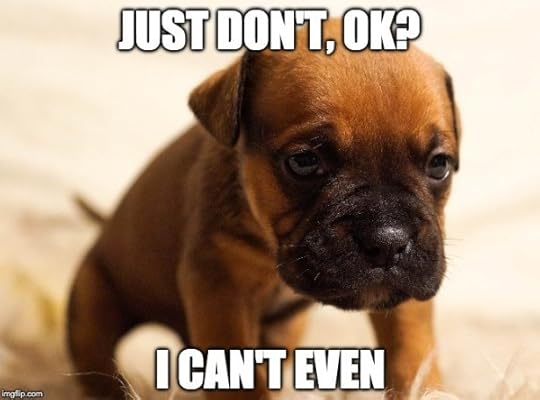
It’s easy to assume that Depression, aka Major Depression, aka Clinical Depression, is a lot like being depressed. Everyone knows what that feels like, after all. The disappointment, the sadness. Everybody gets the blues.
But no. Major Depression is completely different.
“Sadness” is not quite the right word for the feeling. In my experience, it’s a big jumble of feelings — and none of them are good.
For starters, everything has a sense of futility to it. Everything feels pointless, guaranteed to go down in flames and end in failure, so why bother doing anything at all? All roads lead to despair. A black cloud hovers over your head and stubbornly refuses to leave.
You also feel paralyzed by apathy. You don’t want to get out of bed. You don’t want to talk to people — especially people you don’t know. It can be all but impossible to work up the will to do anything.
I also find that there’s a surprising amount of anger. My temper is much closer to the surface. And any tiny thing can set you off. Absolutely everything gets on your nerves; eventually you get on your own nerves!
You feel like the world’s biggest fraud. A total faker, disingenuous about everything you say and do. It’s not like you can go out in public and not smile at people or not be friendly. And what about when you’re around the parents of kids your own children are friends with? Or their teachers? People from work? People from church? The person that rings up your stuff at the store? You can’t act all grumpy and mean when you’re around strangers — no matter how much you want to. And what about your kids, who don’t understand these things? They need love and encouragement; how can you give them that if you’re dreary all the time?
So you paint on a smile and you fake friendliness, compassion, love. While inside, you hate yourself for being a phony. Someone asks how you’re doing, and unless it’s someone you can confide in… You lie. Of course you lie.
Because Depression does not bring about socially acceptable behavior. It’s not okay to be around other people and be melancholy. So there’s a loneliness factor to it as well. Even if you have a confidant who understands, you still have to deal with these dark emotions on the inside, while using all your energy to try and hide it.
What does Depression feel like? It feels hopeless. It’s like your ability to hope has been taken from you. All your hope has been drained away and there’s nothing left.
Think about that. So many of our emotions and the things we do on a daily basis are built on a basic foundation of hope. You go to work in the hopes that you will get paid, that you will advance, that your finances will grow. You get up in the morning because you hope and believe that good things will happen to you today. You do everything you do because the future always holds potential.
Take hope out of that equation and what are you left with? Despair. Anger. Apathy. A desire to be alone. An overwhelming need for sleep. What’s the point of being awake if there’s nothing to hope for?
These feelings are horrible beyond words, and as I said in my book, if it doesn’t sound scary that these emotions can overtake you and you have no control over them… Then I’m not telling it right.
It’s terrifying.

The post What Depression Feels Like appeared first on Robin Parrish.



